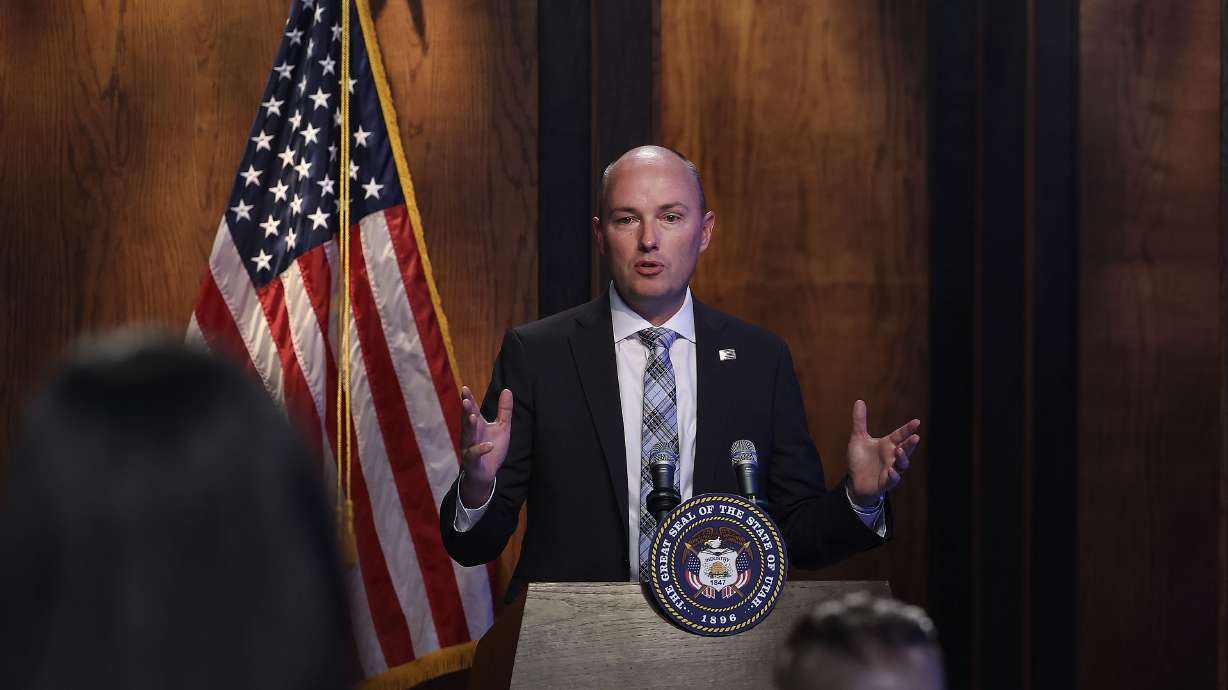Estimated read time: 4-5 minutes
This archived news story is available only for your personal, non-commercial use. Information in the story may be outdated or superseded by additional information. Reading or replaying the story in its archived form does not constitute a republication of the story.
SALT LAKE CITY — Utah Gov. Spencer Cox on Wednesday issued a message regarding Utah's water use policies in a response to coverage from the New York Times and a popular HBO show that criticized how the state consumes water.
The New York Times profiled the drying Great Salt Lake last month, while "Last Week Tonight with John Oliver" featured the West's water crisis in an episode that aired on June 26.
The New York Times article mentioned the state's water diversion as a key reason for the shrinking Great Salt Lake; Oliver, on the other hand, blasted Utah for using the most water of any state in the West, mocking St. George's golf courses and Cox's call for prayers for rain last year, which Oliver called "the worst idea (the state has) had."
Actor Brian Cox capped the segment by playing God in a profanity-laced bit by telling "humans of all faith to come together like rational (obscenity) adults when it comes to water use."
But Utah's governor went on the defense Wednesday.
"Sadly the (New York Times and 'Last Week Tonight with John Oliver') failed to research/report most of the work that has been done on these issues … so I thought it might be helpful to put as much of it as possible in an easy thread for anyone that is really interested," he tweeted before listing off a handful of things Utah has done in the past year to address the drought.
- Utah leaders have hosted "multiple conferences with some of the best experts in the world to study the lake and solutions," Cox said.
- The state legislature passed three bills related to the drought: a bill that provides incentives for homeowners to replace their lawns with drought-tolerant plants and limits lawn sizes at state facilities; a bill that provides homeowners and businesses "more flexibility" to install water-wise landscaping and bans municipalities or homeowners associations from banning drought-tolerant plants; and a bill that uses mining royalties to "improve the conditions and quality of sovereign lands."
- The legislature also passed three bills related to the Great Salt Lake: a bill that provides $40 million for the Great Salt Lake Watershed Enhancement System; a bill that allows the Utah Division of Forestry, Fire and State Lands and "other entities" to buy water rights that go directly to the Great Salt Lake; and a bill that funds a study of the five watersheds that feed into the Great Salt Lake.
- $70 million to renew the Utah Department of Agriculture and Food's Water Optimization Program, which provides funds to help farmers convert to more efficient watering.
Cox went on to add that there is "so much more happening and much more to do."
"Expect several more bills and more funding requests on the Great Salt Lake and water conservation in general," he tweeted. "We have been in drought for 20 years. I don't know if this is a 21-year drought or a 30- or 50-year drought. But I know that we can do hard things. I'm grateful to everyone that has watered their yards and crops less."
About 83% of Utah is currently listed in extreme drought, according to the U.S. Drought Monitor. However, the West is in the middle of a megadrought, which is a series of droughts over the past two decades, that is considered the region's worst in 1,200 years.
Combined, these have impacted the state's reservoirs and lakes; Utah's entire reservoir system is currently at about 59% of capacity, according to the Utah Department of Natural Resources. The Great Salt Lake, on the other hand, dropped to its lowest levels on record this week.
Cox's Twitter thread Wednesday ultimately received a mixture of positive and negative feedback online.
Sen. Dan McCay, R-Riverton, tweeted that Cox showed "the real work Utah is doing to make a difference in water conservation." Nate Blouin, the Democratic nominee for Utah State Senate District 13, added that Utah "does deserve some applause for the actions the legislature took this past session."
Meanwhile, some pointed to the bills that didn't pass in this year's legislative session, such as a bill that would increase the price of water, one that requires water-efficient sinks and showers in new homes or another that would have restricted communities from having requirements for homeowners to maintain lawns altogether, which the New York Times highlighted last month.
Others also questioned why it took two decades of drought for water actions to change.
"Too bad it only started this year," one person tweeted. "The problem is not new and was much more solvable a decade ago."










